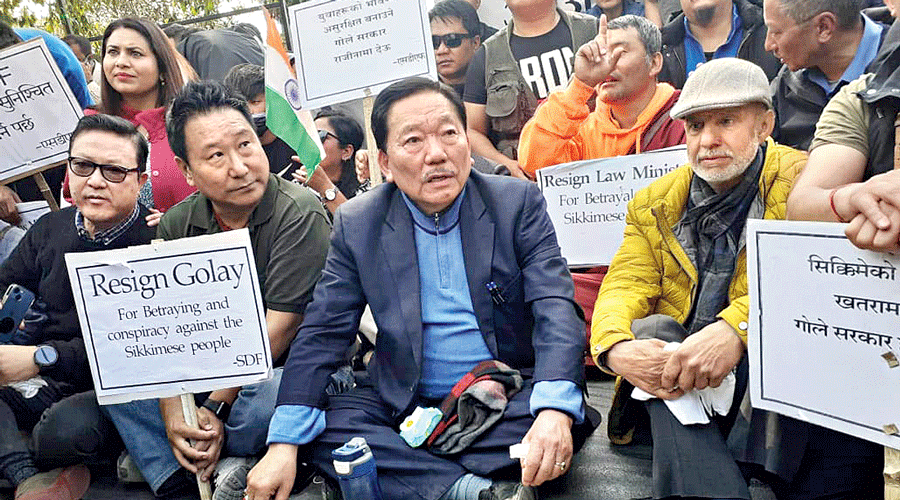Identity politics seems to have moved from the Darjeeling hills to the neighbouring Sikkim with the opposition Sikkim Democratic Front (SDF) calling a 48-hour general strike in the relatively disruption-free Himalayan state from 6am on Saturday to protest against the Supreme Court’s recent judgment that described Nepali-speaking Sikkimese as “persons of foreign origin” and “Nepalese migrants”.
With the Assembly elections scheduled for next year, the issue has suddenly come to the centre stage of political discourse in the Himalayan state.
Identity has been a major issue among Nepali-speaking citizens of India since Subash Ghisingh, the founder of the Gorkha National Liberation Front (GNLF), started a movement in the 1980s for the separate Gorkhaland state in the Darjeeling hills.
However, all along, Nepali-speaking citizens of Sikkim were largely insulated from the identity crisis faced by their counterparts in the rest of India.
“This is largely because Sikkim, a kingdom with a majority Nepali-speaking population, had merged with India. The common perception among the Nepali-speaking Sikkimese has been that their identity, which comes from a separate country, would not be under scanner in a nation it merged with,” said an observer.
According to him, the presence of the community in the Himalayan state has been documented since the 17th century. Besides, Sikkim is the only state in the country with a Nepali-speaking chief minister.
However, in a January 13 judgment in a case related to who all would be called old settlers of Sikkim and thus enjoy exemption from paying income tax, the Supreme Court’s reference to Nepalese as “persons of foreign origin” has suddenly changed the political discourse in the state.
In the judgment, while referring to the Sikkim Income Tax Manual, 1948 (SITM), which was promulgated by the ruler of Sikkim, the court had observed “…there was no difference made out between the original inhabitants of Sikkim, namely, the Bhutia-Lepchas and the persons of foreign origin settled in Sikkim like the Nepalis…”
Old Settlers of Sikkim is a term to describe the 400-odd residents of Sikkim, who were of Indian origin and had been living in Sikkim before the independent kingdom’s merger with India in 1975.
While there is a widespread protest in Sikkim against the Supreme Court’s observation, the longest-serving chief minister of the state, Pawan Chamling, who is also the president of the SDF, on Friday called a 48-hour general strike across the state.
“If the SKM (Sikkim Krantikari Morcha) government tries to foil this bandh, it will be proved, it (too) is anti-Sikkim and anti-Nepali,” said Chamling while addressing SDF supporters at the end of a rally near the District Court in Gangtok to protest against the Supreme Court’s observations.
With Chamling making it clear that he was likely to make the issue the cornerstone of his campaign to stage a return to the chief minister’s office, P.S. Tamang (Golay), the incumbent chief minister, who will be seeking a second term, has also signalled his intention to grab the issue.
Golay has stated that the government has filed a review petition seeking a correction in the court’s observation at a time his government is under stress as one of its cabinet ministers resigned on Thursday protesting against the lack of seriousness by the present government on this issue.
Golay also clarified that he would go to Delhi to “personally” meet the Union law minister Kiren Rijiju to discuss this issue.
The Supreme Court’s judgment allowing tax exemption to old settlers of the state has also led to several questions on the definition of “Sikkimese,” who enjoy some protections under the provisions of the Indian Constitution.
The developments in Sikkim have also begun having an impact across the rest of India as the Nepali-speaking citizens, settled elsewhere in the country, believe that their identity is also coming under the scanner. Community leaders, cutting across party lines, from the rest of the country have also expressed solidarity with the protest in Sikkim.










